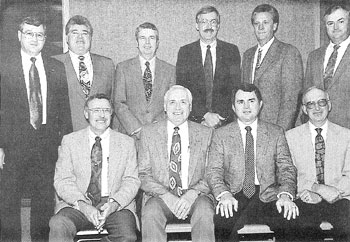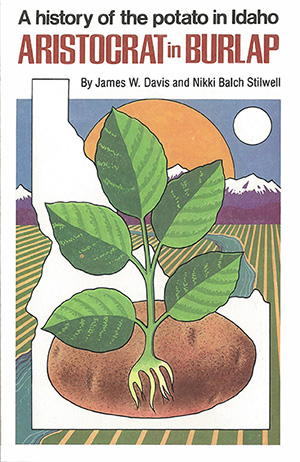 The Idaho Potato Commission, 1992: Left to Right, standing; Executive Director Mel Anderson, Howard Phillips, William Loughmiller, Wayne Theissen, Ray Cammack, Michael Cranney. Left to Right, front row: Don Dixon, Orville Hartman, Jack Parks and chairman, La Verelle Stecklein.
The Idaho Potato Commission, 1992: Left to Right, standing; Executive Director Mel Anderson, Howard Phillips, William Loughmiller, Wayne Theissen, Ray Cammack, Michael Cranney. Left to Right, front row: Don Dixon, Orville Hartman, Jack Parks and chairman, La Verelle Stecklein.
Packing other potatoes in packages identifying them as Idaho® potatoes is the most common type of violation, and a year has not gone by without several cases of this type being brought to the attention of the IPC.
Even Canadian packers have seemingly discovered the profitability of using the Idaho name. Protecting the trademarks seems destined to be a never-ending activity for the Idaho Potato Commission.
As more acres of land were brought into potato production and the promotional job grew, the IPC periodically increased the tax rate to provide more money to keep up with rapidly increasing costs of television and other advertising media. In 1975, the tax rate was set at 30 per cwt and, in 1976, it was 3.250. In September of 1981, the tax was increased to 5 cents per cwt to fund a budget of $3,113,325. By 1988, the budget had grown to $4,941,300 and the assessment rate to 7 cents, and $6,464,500 by 1990 at an 8-cent level of tax.
By 1982, the impact of the growing snack-food fad was beginning to be felt by the Idaho potato industry. Dehydrated potato flakes were being used as the basic ingredient in Procter & Gamble's Pringles and dozens of other snack food products. The value of the Idaho trademark seal received new recognition when P & G announced they would use it on their red package of Pringles.
A significant addition to the Commission's staff and function came about in 1984 when Barbara Bertelli was hired as foodservice director to work with the eating-away-from-home industry in the promotion of processed and fresh Idaho® potatoes.
In July of 1987, the announcement of executive director Gordon Randall's retirement ended his 15-year period of service to the Idaho Potato Commission, a time during which the organization made significant gains in stature and achievement. His state of health had long been in decline as the result of a chronic and incurable ailment.
After a thorough search for a replacement, Mel B. Anderson was hired in December of 1987 to be the Commission's executive director. Anderson had been executive manager of the Idaho Grower Shippers Association and then executive director of Potato Growers of Idaho, the position he left to take the IPC job.


 The Idaho Potato Commission, 1992: Left to Right, standing; Executive Director Mel Anderson, Howard Phillips, William Loughmiller, Wayne Theissen, Ray Cammack, Michael Cranney. Left to Right, front row: Don Dixon, Orville Hartman, Jack Parks and chairman, La Verelle Stecklein.
The Idaho Potato Commission, 1992: Left to Right, standing; Executive Director Mel Anderson, Howard Phillips, William Loughmiller, Wayne Theissen, Ray Cammack, Michael Cranney. Left to Right, front row: Don Dixon, Orville Hartman, Jack Parks and chairman, La Verelle Stecklein.